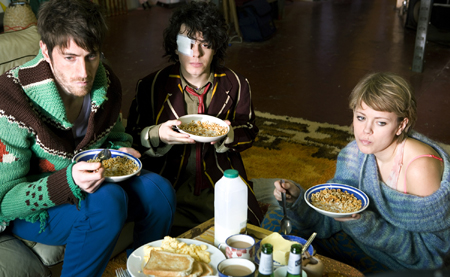[This is the second in a series of dispatches relating to the New Directors/New Films series, running between March 25 and April 5 at MOMA and the Film Society of Lincoln Center.]

The title of Alexis Dos Santos’s second feature film suggests either a Chekhovian spright or a close kinship with Francois Truffaut’s Stolen Kisses, perhaps one of the most definitive portraits of young people ever burned to celluloid. Certainly there are many allusions to French cinema throughout: a Jules and Jim-like menage-a-trois and a belabored homage to the bear suit in Renoir’s Rules of the Game that suggests a lack of auterial confidence. But Unmade Beds is a plodding and episodic film that can’t quite locate the definitive comforter to keep its many bedhopping twentysomethings from toppling out of the boxspring. A movie involving aimless characters should work, if only because this involves people having to react to random scenarios and reveal who they are. Certainly in Axl, a 20-year-old rootless kid from Madrid searching for his dad, there is some promise. By Axl’s count, he has slept in some twenty beds over twenty years. But if his current lifestyle reflects a certain deficiency in his counting skills, I must report my distrust in this tidy philosophical number. Now in London, he goes out to party every evening and can never quite remember what happened the night before. This results in a stolen kiss from someone he was carnal with the night before. Somehow, he stumbles his way into an industrial flat where nobody seems to pay rent and there seems to be plenty of liquor (courtesy of a club named the Lost and Found). “How many people live here?” asks Axl. His new roommate (a parachutist enthusiast, as it turns out) replies, “No idea. It changes all the time.” Of course, you never know when the place is going to be used to shoot a dubious music video with people dressed in animal suits or when you might be asked to select one of the many ratty mattresses in the cellar. Having spent a portion of my early twenties bouncing around similar living arrangements, I commend Dos Santos for going out of his way to depict this uncertain bump and grind.
But let’s be clear on this. The film is on shaky ground, because it tries to balance the clueless frivolities of youth with a crude conceptual philosophy (“Two people will always be one plus one”). That’s a tall order for even the most talented filmmaker. And Dos Santos mangles this severely with his other major character, Vera (who is French!), who also lives in the flat and spends much of her time meeting up in motel rooms (one is numbered 353, a palindrome reflecting just how this will turn out) with a man who who later reveals his emotional complexity with a homespun song (“I’d like to spend the day with you / I’d like to spend the night as well” are some of the lyrics). Here is a lad that you might find charming if you really just want to boff a guy who will pick up the lodging bill. You can scrounge up a dozen of them without serious effort in Williamsburg. Vera and the man — I know that he had a name, I know that I wrote it down, I know that I can probably IMDB it, but he made such little impact on me that it scarcely seems worth the effort — settle into an affair in which no phone numbers are exchanged. Only meeting times and locations. Dos Santos attempts a semiotic significance by having the man constantly dash the tips of his fingers on stair railings. (Again, the French film imagery!) But we never really get a true sense of the desperate loneliness behind this relationship, save for one moment in which this couple dashes onto the next random train and a decently-directed sex scene that has the two nervously discovering their bodies. Unfortunately, every time these two meet up, Dos Santos has Tindersticks’s “Cherry Blossoms” play. And play again. And again. I mean it’s a good song and all, but — “Get in the morning.” Oh, shit again? No, Dos Santos! “Climb in beside you!” Yeah, I get it. For fuck’s sake, make it stop! “Watch the clock for half an hour.” No, make it stop! I hate this song!
It’s safe to say that if I were Stuart Ashton Staples, I would seek legal action against Dos Santos for making one of my well-known croons almost totally unappealing over the course of 93 mere minutes.
Axl does track down his dad. He’s a staid real estate agent who Axl welcomes to his jungle by pretending to look for an apartment. But will he confront him with the truth? It’s the allegorical unmade bed in action. That steady place where you can fall fast asleep so long as you combat your laziness and take some responsibility in the morning. One almost expects a flashing subtitle to spell this out and clue in that part of the audience who has fallen asleep. (I counted five dozers at the screening I attended.) There’s an odd backstory in which a young Axl pretended to be a superhero and leaped from a tall domestic place only to injure himself. This boyhood slip-and-fall, by no means comical, is revisited in the present.
But neither Axl nor Vera are half as interesting as a snotty bookstore employee who insists that Vera arrange all the books in their correct order. Dos Santos continually suggests that Axl and Vera will eventually be forced to confront the need for some kind of order in their lives. But he isn’t a daring enough filmmaker to suggest that these two might find order on their own terms. He’s good enough to reveal their wanton desires, but what Truffaut did so well with his Antoine Doinel films was to juxtapose his drifting slacker against the need to find a sense of purpose — even accidentally. This bookstore employee may very well be an allusion to the struggling writer in the Doinel films who is always hitting Antoine up for cash in the street. “At least this writer is trying to do something on his own terms,” Truffaut is almost screaming to us with these moments. “But Antoine is not. Will Antoine finally get it?”
Well, Axl and Vera never do get it. They don’t even come close to getting it. Vera keeps a Moleskine in which she neatly inserts her photos. But this is just killing time. That we don’t have any sense of where she might go or what she might do with her life is a major cinematic debilitation. We know pretty early on how Axl’s quest for his father will turn out. And we also know that without this pursuit, he’s nothing. Axl tells his father that he’s in business school. He clutches onto his father’s business card and makes random calls to him on a pay phone. But give him five years and he’ll be a wreck. He has only a schoolboy’s jacket he finds at the flat to cloak the internal qualities he can’t coax out. But shouldn’t we have some sense of what lurks behind these details? I’m not against films about rudimentary twentysomethings, but shouldn’t we be curious?
